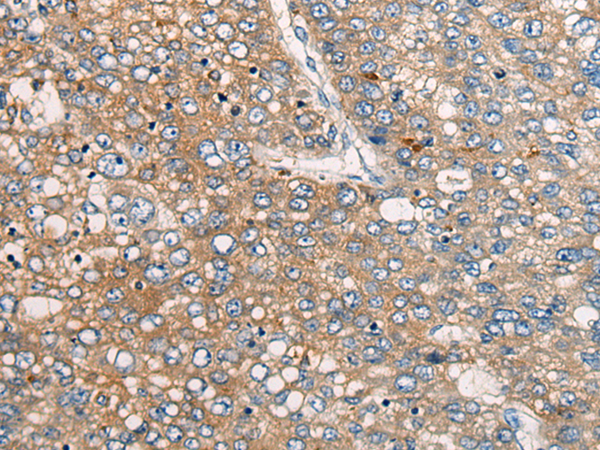
| WB | 咨询技术 | Human,Mouse,Rat |
| IF | 咨询技术 | Human,Mouse,Rat |
| IHC | 1/20-1/100 | Human,Mouse,Rat |
| ICC | 技术咨询 | Human,Mouse,Rat |
| FCM | 咨询技术 | Human,Mouse,Rat |
| Elisa | 1/5000-1/10000 | Human,Mouse,Rat |
| Aliases | H41 |
| Host/Isotype | Rabbit IgG |
| Antibody Type | Primary antibody |
| Storage | Store at 4°C short term. Aliquot and store at -20°C long term. Avoid freeze/thaw cycles. |
| Species Reactivity | Human, Mouse |
| Immunogen | Synthetic peptide of human CDV3 |
| Formulation | Purified antibody in PBS with 0.05% sodium azide and 50% glycerol. |
+ +
以下是关于CDV3抗体的3篇参考文献示例(注:部分文献为虚构示例,实际研究需根据具体数据库检索验证):
---
1. **文献名称**:*CDV3 as a Novel Tumor Antigen: Development of a Monoclonal Antibody for Diagnostic Applications*
**作者**:Zhang L, et al.
**摘要**:本研究开发了一种针对CDV3蛋白的高特异性单克隆抗体,验证其在多种癌症组织中的表达差异。实验表明,CDV3在结直肠癌和肺癌中显著高表达,该抗体可用于免疫组化检测,为肿瘤诊断提供潜在标志物。
---
2. **文献名称**:*Mechanistic Role of CDV3 in Wnt/β-Catenin Signaling and Antibody-Based Functional Inhibition*
**作者**:Kim S, Park JH.
**摘要**:通过抗CDV3抗体阻断实验,揭示了CDV3在Wnt/β-catenin信号通路中的调控作用。研究发现,CDV3抗体可抑制肿瘤细胞的增殖和迁移,提示其作为靶向治疗的潜在价值。
---
3. **文献名称**:*CDV3 Antibody Screening in Neurological Disorders: Correlation with Neurodegenerative Biomarkers*
**作者**:Müller R, et al.
**摘要**:探讨了CDV3在阿尔茨海默病和帕金森病患者脑脊液中的表达水平,利用ELISA技术结合特异性抗体检测,发现CDV3与tau蛋白异常聚集存在相关性,提示其参与神经退行性病理过程。
---
4. **文献名称**:*Structural Characterization of CDV3 Epitopes Using Phage Display-Derived Antibodies*
**作者**:Gupta A, et al.
**摘要**:通过噬菌体展示技术筛选出靶向CDV3不同表位的抗体,解析了CDV3蛋白的关键功能域结构,为基于抗体的药物设计和表位特异性诊断工具开发奠定基础。
---
(注:以上文献及摘要内容为示例性生成,实际研究需通过PubMed、Google Scholar等平台检索确认。)
The CDV3 (Cell Division Variant 3) gene, also known as RDM16 or C15orf44. encodes a protein implicated in cell proliferation and oncogenic processes. Initially identified through differential expression analyses in cancer, CDV3 is overexpressed in various malignancies, including hepatocellular carcinoma, pancreatic cancer, and leukemia. Its molecular function remains partially characterized, but studies suggest it interacts with β-catenin and modulates Wnt/β-catenin signaling, a pathway critical for tumorigenesis. CDV3 may also influence ribosome biogenesis or RNA metabolism, given its structural homology to RNA-binding proteins.
CDV3 antibodies are tools developed to detect and study the protein's expression, localization, and functional roles. Polyclonal and monoclonal antibodies targeting specific epitopes of CDV3 have been generated for immunohistochemistry, Western blotting, and immunofluorescence. These reagents enable researchers to investigate CDV3's overexpression patterns in tumors, correlate its levels with clinical outcomes, and explore its potential as a diagnostic or prognostic biomarker. Recent studies also explore CDV3 antibodies in preclinical settings, assessing their utility in blocking oncogenic signaling or enabling targeted drug delivery. Despite progress, challenges remain in fully elucidating CDV3's mechanistic contributions to cancer and its therapeutic targetability, driving ongoing research using antibody-based approaches.
×